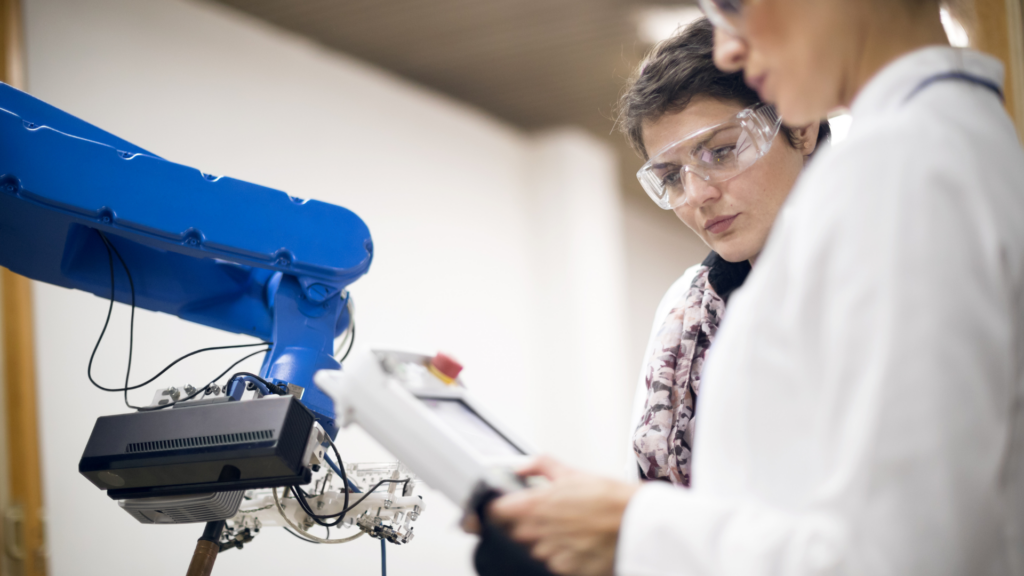As part of a continued effort to bring semiconductor production back to the United States from Asia, the Biden-Harris Administration announced new funding through CHIPS for America that will help small businesses research new technologies, the U.S. Department of Commerce said on Tuesday (April 16).

The Notice of Funding Opportunity (NOFO) seeks applications from eligible small businesses to explore the technical merit or feasibility of an innovative idea or technology for developing a viable product or service in the commercial microelectronics marketplace.
CHIPS for America will provide a briefing on details of the NOFO on Thursday, April 18, at 3:30pm ET. Webinar participants must register in advance.
“CHIPS for America is committed to building opportunities for all businesses, including small businesses, to prosper as we grow the U.S. semiconductor industry. Because we recognize the high costs associated with innovation in the semiconductor industry, we’re offering awardees of this funding opportunity up to the maximum amount possible per award by the Small Business Innovation Research Program to ensure opportunity is within reach for all businesses seeking to be part of the U.S. semiconductor ecosystem,” said U.S. Secretary of Commerce Gina Raimondo.
The CHIPS for America program
The Biden-Harris Administration set a goal for the CHIPS Program to produce 20% of the world’s leading-edge semiconductors domestically by 2030. As much as $54 million in funding is available for critically needed research projects, such as,
- Measurement services, tools, and instrumentation
- Innovative manufacturing metrologies
- Novel assurance and provenance technologies
- Advanced metrology research and development (R&D) testbeds
The Commerce Department is overseeing $50 billion to revitalize the U.S. semiconductor industry and strengthen the country’s economic and national security. CHIPS for America R&D within the Commerce Department is responsible for administering $11 billion to advance U.S. leadership in semiconductor R&D.
Pioneering the Future: The Science of Measurement
Metrology, the science of measurement and its application, plays a key role in semiconductor manufacturing, the Department of Commerce said. As devices become more complex, smaller, and multi-layered, the ability to measure, monitor, predict, and ensure quality in manufacturing becomes much more difficult and uncertain.
In September 2022, the National Institute of Standards and Technology (NIST), a nonregulatory Federal agency within the Commerce Department, published Strategic Opportunities for U.S. Semiconductor Manufacturing. The report identified seven grand challenges that need critical attention —from a metrology perspective — in order for the U.S. to achieve leadership in semiconductor research, development, and manufacturing. The report includes input from industry, academia, and government, and provides strategies for addressing the grand challenges.
“Small businesses have an important role to play in the semiconductor ecosystem,” said Under Secretary of Commerce for Standards and Technology and NIST Director Laurie E. Locascio.
“NIST has long supported the SBIR program, and this funding opportunity dedicated to CHIPS Metrology will help give small businesses the opportunity to take innovative ideas, scale them for the commercial marketplace, and boost the U.S. economy,” Locascio added.
The Small Business Innovation Research
This funding opportunity is provided through the Small Business Innovation Research (SBIR) Program, the federal government’s largest platform to promote U.S. technology innovation research and private-sector commercialization. NIST is one of 11 federal government agencies that operate an SBIR program.
Funded activities are expected to include, but not necessarily be limited to,
- compact fieldable cryogenic technologies
- compact extreme ultraviolet (EUV) sources
- the seven grand challenges
Learn more about the CHIPS Metrology Program and the seven grand challenges.
The CHIPS and Science Act
Biden’s CHIPS and Science Act was signed two years ago to bolster domestic semiconductor production in the country. The bill received bipartisan support in Congress and now has $52.7 billion in subsidies, along with a 25% tax incentive for investments in domestic chip investments worth roughly $24 billion.
Semiconductor technology forms the foundation of everything from automobiles to household appliances to defense systems, according to a White House fact sheet.
“America invented the semiconductor, but today produces about 10 percent of the world’s supply — and none of the most advanced chips. Instead, we rely on East Asia for 75 percent of global production. The CHIPS and Science Act will unlock hundreds of billions more in private sector semiconductor investment across the country, including production essential to national defense and critical sectors,” according to the White House.
About CHIPS for America
CHIPS for America is part of President Biden’s economic plan to invest in America, stimulate private sector investment, create good-paying jobs, make more in the United States, and revitalize communities left behind. CHIPS for America includes the CHIPS Program Office, responsible for manufacturing incentives, and the CHIPS Research and Development (R&D) Office, responsible for R&D programs.
Both offices sit within the National Institute of Standards and Technology (NIST) at the Department of Commerce. NIST promotes U.S. innovation and industrial competitiveness by advancing measurement science, standards, and technology in ways that enhance economic security and improve our quality of life. NIST is uniquely positioned to successfully administer the CHIPS for America program because of the bureau’s strong relationships with U.S. industries, its deep understanding of the semiconductor ecosystem, and its reputation as fair and trusted. Visit www.chips.gov to learn more.












